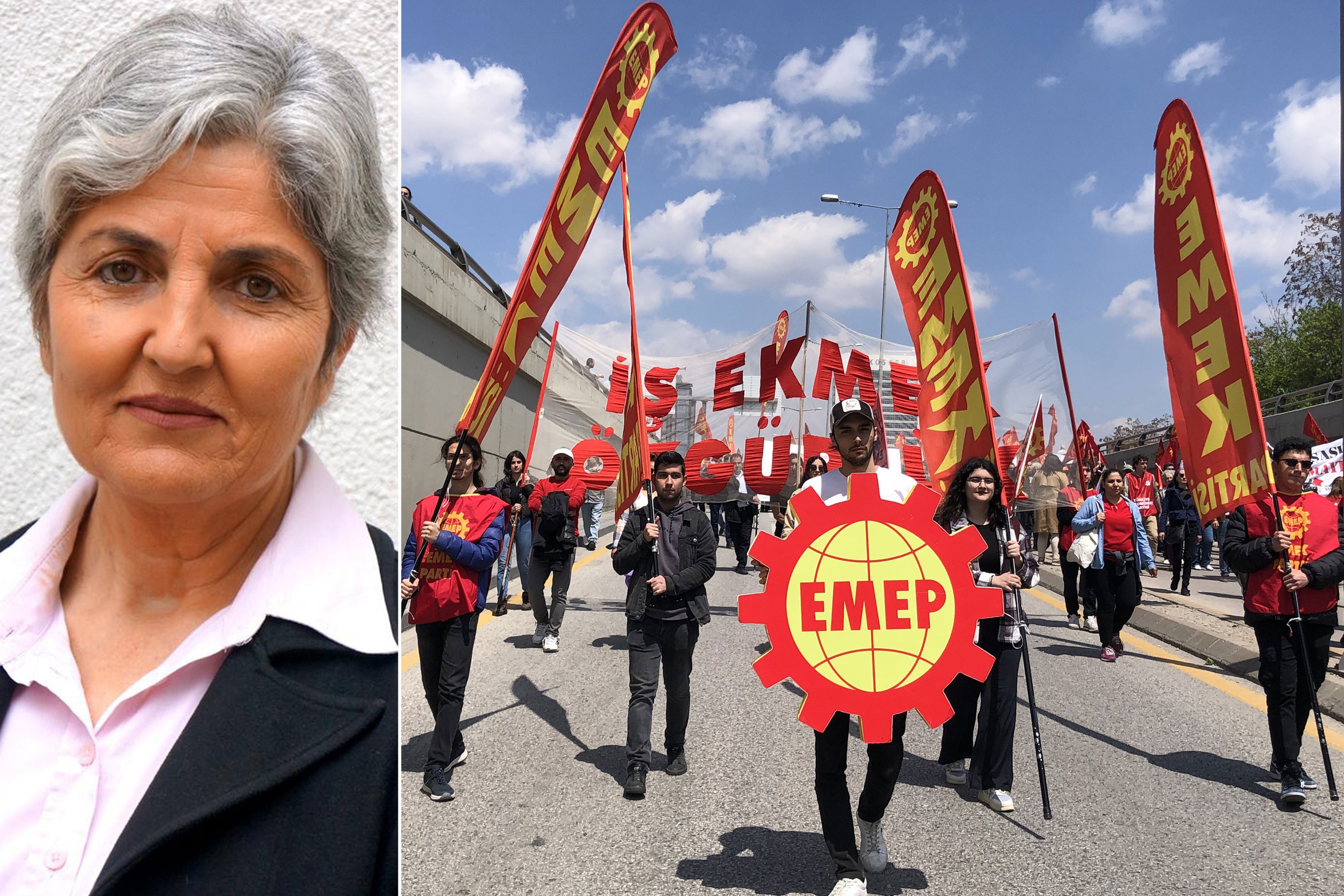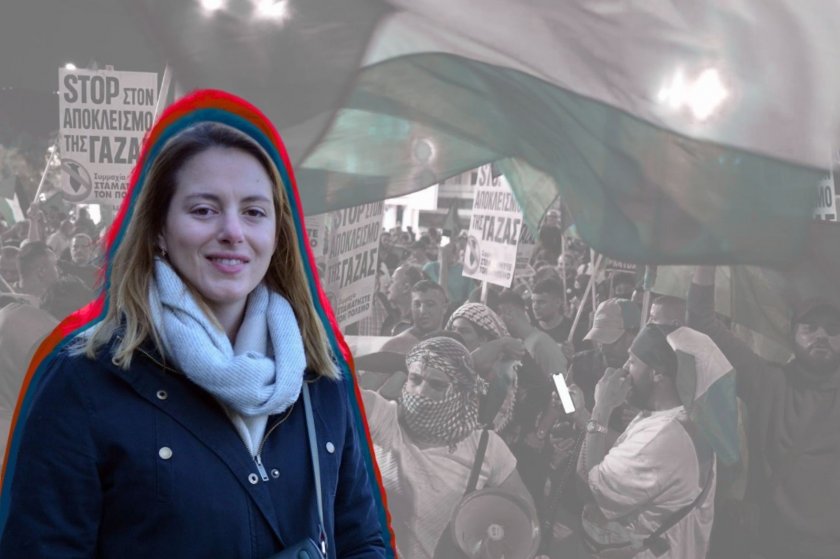EMEP Chair Selma Gürkan: The way to change is struggle and organisation
EMEP Chair Selma Gürkan answered our questions about the minimum wage negotiations, the obstacle of the union bureaucracy in front of the working class, the elections and the AKP's economic policies.

Fotoğraf: Evrensel
Birkan BULUT
Ankara
Labour Party (EMEP) Chair Selma Gürkan answered our questions about the struggle of workers against the increasing cost of living and union bureaucracy, the election results and the path that the Labour and Freedom Alliance will follow in the coming period. Gürkan pointed out that the Erdoğan administration faces serious dilemmas, especially in the field of economy, even though it won the elections and said, "The option for change in this country is not the ballot box alone. The way to change is struggle and organisation. The ballot box is only one of the stops of the struggle."
The minimum wage was set at 11 thousand 402 liras ($484 at the 20 June exchange rate). Each increase melts in a short time. However, what draws reaction is that more than half of the labourers earn minimum wage. In this sense, what will be the end of minimum wageisation?
When the minimum wage discussions started, the calculation was based on $500. Then the President of the Turkish Exporters Assembly argued that a minimum wage of more than $350 would cause problems in the economy. However, when we look at the purchasing power of the minimum wage, which is 484 dollars today, they have again condemned the working class to a wage at the hunger limit. Even before the ink of the minimum wage agreement was dry, the organisations of the bosses demanded incentives including tax and insurance premiums. The minimum wage is the lowest wage. The wage scale should be much higher than this. But more than 60 per cent of the working class in Turkey works at the minimum wage level. The president of Türk-İş Confederation had said "I hope we will find what we hope for" about the minimum wage. Then they went to thank Erdoğan together with the bosses' organisation, TISK!
In addition to determining the minimum wage, it is seen that many union administrations are serious obstacles to struggle in collective agreements and strike bans. So how can the labour movement overcome the obstacle of the trade union bureaucracy?
I wonder how many meetings Türk-iş president held with workers on "How much should the minimum wage be"? If there is an expectation, how many workers have formed it with their opinions? As the Labour Party, we say that the working class must first of all own its own unions. It must have a say in the decisions taken. If there is a collective agreement, all the demands should be discussed and determined among the workers. But we know that the trade union bureaucracy will not even go near this.Nevertheless, despite all the hypocrisy of the trade union bureaucracy, it is possible for a combative trade unionism to develop. There are places where this is happening. Most recently, Bekaert workers overcame the strike ban signed by the president and signed their collective agreement. They showed us how to overcome strike bans and union bureaucracy. In this respect, workers should not be content with being union members, they should be organised by taking part in the workplace representative councils and workplace committees of the unions.
How do you see the path the government will follow after the elections?
The government considers it a victory, but it will not be able to move forward as it wants. It has realised that it will win the elections wherever it stands, and it has also seen its dilemmas. In two metropolises such as İstanbul and Ankara, which are the jugular veins of industry, trade and economy, Erdoğan finished the elections behind. We see that the government lost votes in many industrial basins. Because their economic policies are hostile to workers, small tradesmen and peasants. Therefore, the government knows that the social movement it will face in this area will take away its power. Considering the local elections in the coming period, it will look for the conditions to produce consent in the economy again. However, where it cannot produce consent, there will be no pressure it will not resort to. In other words, it will impose the mechanisms of oppression on the whole society by making enemies, especially the Kurdish movement.
So how will the Labour and Freedom Alliance continue on the road under these difficult conditions?
We observe deficiencies in terms of carrying out a holistic work in terms of public support for the programme put forward by the Labour and Freedom Alliance. It was an election process weakened by the debates between the social segments addressed by the parties in the alliance. But the programme of the alliance is still valid. It is one of the most advanced programmes that has been put forward so far in terms of being a democracy programme that can unite on minimum commons. Now, our alliance is looking for a new path to walk by recognising its shortcomings. Without being satisfied with the current limits of the alliance, we need to talk about wider unions of struggle, drawing lessons from the experiences of the electoral process. I do not only mean in the sense of increasing the number of political formations. When we consider the political reactionaries allied with the government, all labourers, especially women, are facing this danger. In order to dissipate reaction, we need to find a way out in terms of increasing the struggle for secularism and how to break the influence of sects and communities in politics. Actually, the way to do this is clear: A united struggle around common demands. The option for change in this country is not the ballot box alone. The way to change is struggle and organisation. The ballot box is only one of the stops of the struggle.
EMEP will be in parliament with two MPs. How will you work?
EMEP has two MPs, but the Labour and Freedom Alliance has 65 MPs. Therefore, we need to think about how we can turn the parliament into a position of social struggle with 65 deputies. We will take steps to use the parliament for the demands of the people through the strong struggle unity of the alliance, and if there are other MPs who want to be the defender of the social struggle, we will take steps to use the parliament for the demands of the people by establishing unions with them from time to time. On the other hand, EMEP has its own programme. Our two MPs will try to be the voice of the working class, peasants and public labourers. Just being the voice is not enough. Because we are positioning ourselves to make the politics of the working class itself, not a politics on the side of the class.
{{491172}}
{{491020}}
Forwarding to the next article...
10 seconds remaining





Follow Evrensel